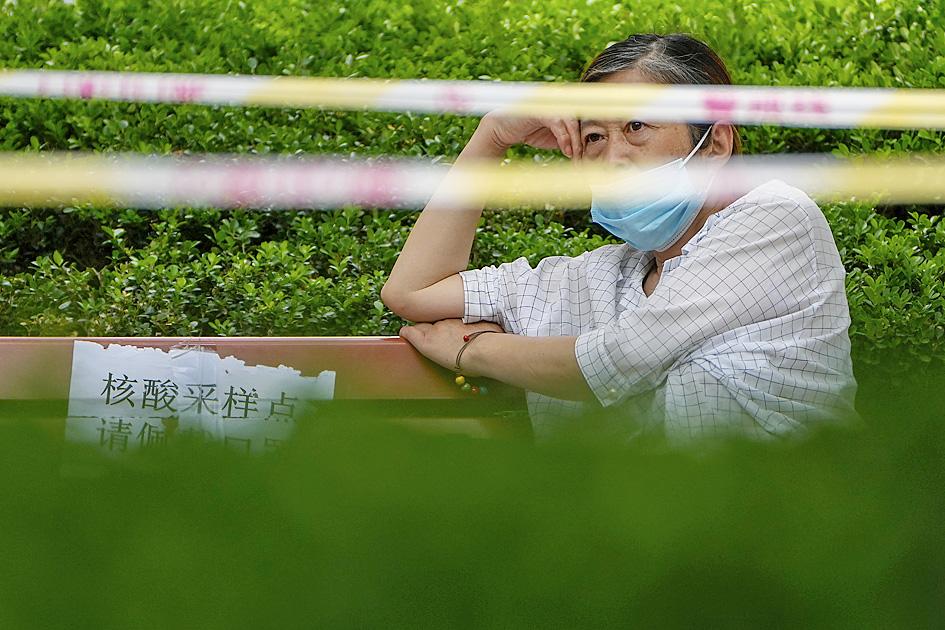China’s revised COVID-19 guidelines, which cut a quarantine requirement in half for inbound travelers, also create a standardized policy for mass testing and lockdowns when cases of the disease flare, showing that the country still has a zero-tolerance approach to the virus.
Chinese President Xi Jinping (習近平) solidified the position during a trip to Wuhan, where the pathogen first emerged in 2019, saying that China is capable of achieving a “final victory” over the virus.
The “zero COVID-19” policy is the most effective and economic approach for the country, Xi said during the trip on Tuesday, Xinhua news agency reported.

Photo: AP
The first update of the Chinese National Health Commission’s protocol since May last year sparked enthusiasm in financial markets and increased demand for travel by cutting quarantine time in half, with some analysts projecting that it might signal the start of China’s withdrawal from the “zero COVID-19” approach, which has largely cut it off from the rest of the world since 2020.
However, a closer reading of the document shows it is codifying critical COVID-19 policies that have widely varied until now, and lays the groundwork for faster and more extensive deployment of testing and lockdowns.
Even with reducing quarantine times to 10 days from as long as three weeks, China remains one of the most difficult countries to enter.
“They are modest steps that do not materially change China’s overall COVID stance,” S&P Global Ratings Asia Pacific chief economist Louis Kuijs said. “Indeed, as long as dynamic zero remains the overall guiding principle, new outbreaks pose serious risks to the economy.”
The move further consolidates and adjusts China’s “zero COVID-19” strategy given the more infectious nature of the Omicron variant of SARS-CoV-2, and explains how local officials are expected to deal with the virus in the future.
“The protocol comprehensively follows the dynamic zero policy,” health commission spokesman Mi Feng (米鋒) told a news briefing on Tuesday. “It’s not loosening control. The goal is to be more scientific and accurate.”
The guidelines detail testing and control measures for different levels of risks that can be implemented across China.
In areas classified as “high-risk,” where the virus has been detected in neighborhoods or workplaces, people are strictly banned from leaving their homes. The level would be downgraded to “middle-risk” after the area has been deemed virus-free for a week and everyone tests negative on the seventh day. Another three days without infections would put the area in the “low-risk” category.
For large cities, including provincial capitals and places with more than 10 million residents, mass testing should be conducted every day in virus-hit areas, stopping only when no community cases are found for three days in a row. Residents should undergo another round of tests three days later, ending only if there are still no new infections.
If the virus has spread across districts, provincial level health authorities would make the call on whether citywide testing is needed.
The standardized rules are also aimed at preventing local authorities from intensifying curbs on their own, a common phenomenon as municipal Chinese Communist Party officials fear angering Beijing by failing to execute “zero COVID-19” policies.
The rules were almost immediately put to the test, as the detection of 15 cases in central Anhui Province yesterday led to the lockdown of one county with 760,000 people.
Shanghai and Beijing, which battled outbreaks throughout the spring, reported no new local infections for Monday, a milestone that was seized upon as showing that Beijing’s strategy can be successful.
On Tuesday, the financial hub again reported no cases, while the capital reported one new case.

Philippine President Ferdinand Marcos Jr has fired his national police chief, who gained attention for leading the separate arrests of former Philippine president Rodrigo Duterte on orders of the International Criminal Court and televangelist Apollo Carreon Quiboloy, who is on the FBI’s most-wanted list for alleged child sex trafficking. Philippine Executive Secretary Lucas Bersamin did not cite a reason for the removal of General Nicolas Torre as head of the 232,000-member national police force, a position he was appointed to by Marcos in May and which he would have held until 2027. He was replaced by another senior police general, Jose

STILL AFLOAT: Satellite images show that a Chinese ship damaged in a collision earlier this month was under repair on Hainan, but Beijing has not commented on the incident Australia, Canada and the Philippines on Wednesday deployed three warships and aircraft for drills against simulated aerial threats off a disputed South China Sea shoal where Chinese forces have used risky maneuvers to try to drive away Manila’s aircraft and ships. The Philippine military said the naval drills east of Scarborough Shoal (Huangyan Island, 黃岩島) were concluded safely, and it did not mention any encounter with China’s coast guard, navy or suspected militia ships, which have been closely guarding the uninhabited fishing atoll off northwestern Philippines for years. Chinese officials did not immediately issue any comment on the naval drills, but they

POWER CONFLICT: The US president threatened to deploy National Guards in Baltimore. US media reports said he is also planning to station troops in Chicago US President Donald Trump on Sunday threatened to deploy National Guard troops to yet another Democratic stronghold, the Maryland city of Baltimore, as he seeks to expand his crackdown on crime and immigration. The Republican’s latest online rant about an “out of control, crime-ridden” city comes as Democratic state leaders — including Maryland Governor Wes Moore — line up to berate Trump on a high-profile political stage. Trump this month deployed the National Guard to the streets of Washington, in a widely criticized show of force the president said amounts to a federal takeover of US capital policing. The Guard began carrying

Ukrainian drone attacks overnight on several Russian power and energy facilities forced capacity reduction at the Kursk Nuclear Power Plant and set a fuel export terminal in Ust-Luga on fire, Russian officials said yesterday. A drone attack on the Kursk nuclear plant, not far from the border with Ukraine, damaged an auxiliary transformer and led to 50 percent reduction in the operating capacity at unit three of the plant, the plant’s press service said. There were no injuries and a fire sparked by the attack was promptly extinguished, the plant said. Radiation levels at the site and in the surrounding